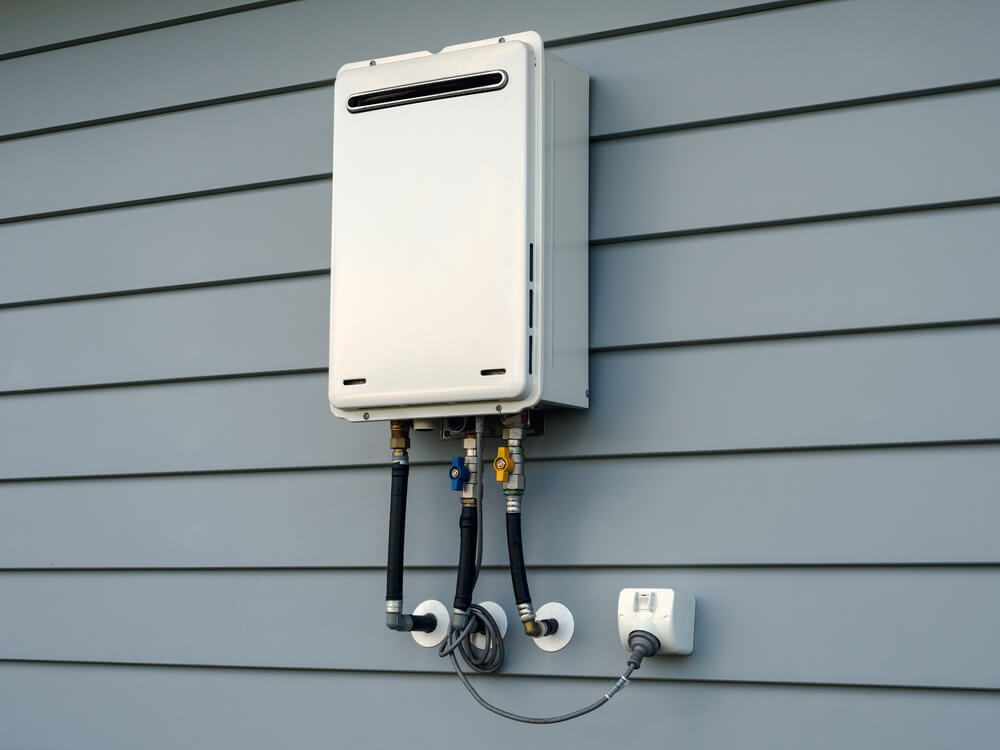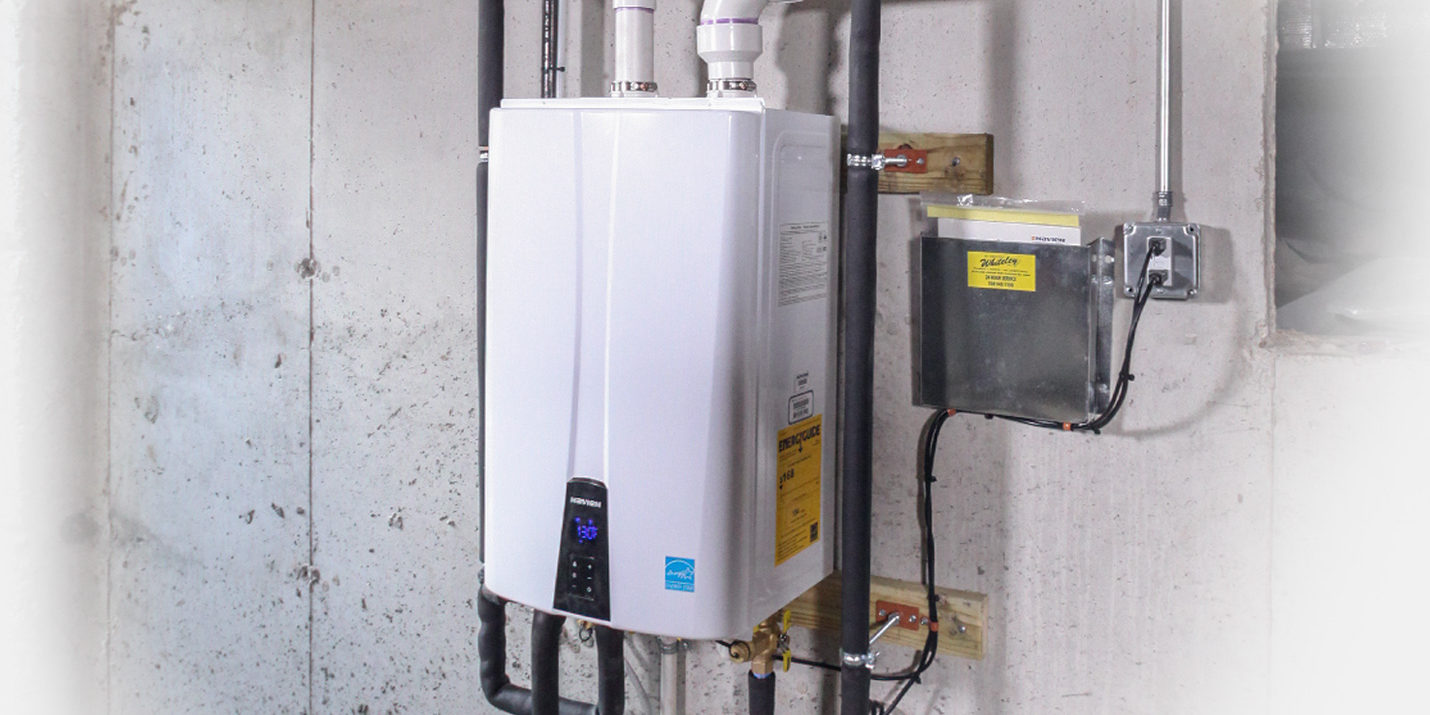Elevating Household Convenience: The Benefits Of Tankless Water Heaters
Elevating Household Convenience: The Benefits Of Tankless Water Heaters
Blog Article
Right here down the page you will find some extremely good ideas pertaining to 5 Benefits of Tankless Water Heaters.

In a globe where ease and efficiency preponderate, it's not a surprise that house owners are frequently on the lookout for smarter means to handle their home's power consumption and comfort. One innovation that has actually continuously obtained appeal is the tankless water heater. But just what makes these systems stand out from the standard tank-based models a lot of us grew up with? Allow's dive in and check out the benefits of tankless water heaters, aiding you determine if it's time to make the button in your home.
Intro
Picture this: you enter the shower after a long day, expecting a comforting cascade of warm water, just to be welcomed by icy droplets since the last individual utilized all of it up. Sound familiar? Typical water heaters keep a set quantity of warm water, meaning you're at the mercy of that storage tank's supply. Tankless systems, on the other hand, warmth water on demand. No more running out mid-shower, say goodbye to fumbling with routines simply to make certain warm water is readily available.
Understanding Tankless Hot Water Heater
What Are Tankless Hot Water Heater?
Tankless hot water heater, occasionally called on-demand or instant hot water heater, offer warm water only as it's required. Rather than saving gallons of pre-heated water, these systems kick right into action the minute you switch on the tap. Water travels through a warmth exchanger, warming up in real-time, meaning you get a nonstop flow of warm water without the demand for a large storage tank resting lazily by.
How Do They Differ from Standard Solutions?
Standard heating systems hold a reservoir of hot water, using energy to maintain that container at a regular temperature level. Tankless devices remove the standing supply, reducing squandered energy and the cumbersome impact of a big cyndrical tube. Essentially, you're updating from a "accumulation" frame of mind to a "made-to-order" method.
Common Types of Tankless Devices
Tankless water heaters generally come in 2 ranges: gas and electric. Gas versions often tend to provide greater flow prices, ideal for larger families, while electrical models typically offer smaller homes and are usually simpler to install. In addition, some systems are made for point-of-use (serving one component) while others can manage the entire home's warm water needs.
Key Benefits of Tankless Water Heaters
1. Limitless Warm Water Supply
Ever had to arrange showers so every person gets their fair share of warm water? With tankless, that comes to be a thing of the past. As long as the heating unit's circulation ability isn't gone beyond, you can take back-to-back showers without developing into a popsicle.
2. Power Efficiency and Expense Savings
No more heating up a giant container's well worth of water and keeping it toasty throughout the day. Tankless heating units minimize standby power losses, which can lower energy costs. While the first price could be higher, the long-term savings typically justify the investment.
3. Space-Saving Layout
If your home is short on storage space, getting rid of the bulky container maximizes beneficial room. Tankless systems are portable and can commonly be mounted on wall surfaces, stashed in corners, or set up in limited utility storage rooms without hogging the entire area.
4. Longer Life expectancy
A properly maintained tankless water heater can outlast its tank-based relative. Typical containers may last 10-15 years, while tankless designs can maintain chugging along for twenty years or more, making them a solid investment gradually.
5. Improved Water Top Quality
Saving water in a container can sometimes lead to sediment build-up or a slightly "off" taste. With tankless systems, fresh water is heated up instantly, lowering the opportunities of debris buildup and possibly using cleaner-tasting water.
Considerations Before Changing
Though the benefits are engaging, it's a good idea to consider a few variables prior to fully committing.
Preliminary Financial Investment Expenses
Tankless heaters generally feature a higher ahead of time cost. Between the unit itself and possible installment modifications, the first cost could offer you sticker label shock. But keep in mind to view it as a long-lasting investment.
Setup Requirements
Depending upon your home's facilities, you could need additional electrical ability or gas line upgrades. Ensure you comprehend the installment requirements and speak with an expert to stay clear of surprises.
Assessing Your Home's Water Usage Patterns
If your home concurrently makes use of numerous components with high warm water need, see to it the device's circulation price meets your needs. Understanding your usage patterns aids you select the best dimension and sort of tankless heater.
Maintenance and Treatment Tips
Tankless systems are reasonably low maintenance, but they aren't set-it-and-forget-it appliances.
Regular Cleaning and Descaling
Difficult water minerals can build up in the warmth exchanger, influencing effectiveness. Regular descaling (frequently recommended every year) keeps the system going for peak performance.
Yearly Professional Assessments
A yearly checkup from a professional makes sure small issues are captured early. They'll evaluate the system's efficiency, look for leaks, and assist keep optimal effectiveness.
Making Certain Correct Ventilation
For gas models, correct air flow is important to safely get rid of exhaust gases. Make sure airing vent systems are clean and properly mounted to stop any possible safety and security hazards.
Contrasting Different Brands and Models
Not all tankless water heaters are developed equivalent.
Looking Into Dependable Manufacturers
Search for credible brand names with a background of producing quality units. A dependable manufacturer often provides far better client assistance and longer service warranties.
Reading Evaluations and Individual Feedback
Individual reviews and feedback from next-door neighbors or friends who have gone tankless can offer valuable understandings. In some cases, real-life experiences can be more informing than advertising brochures.
Installment: Do It Yourself or Specialist?
While some homeowners relish dealing with projects themselves, tankless installation might not be the best time to break out the toolbox.
Pros and Cons of DIY Setup
A DIY install could save cash, however it includes dangers. Incorrect installment can bring about inadequacy or security concerns. If you come in handy and have experience, it may be feasible-- but wage caution.
When to Call a Professional Plumbing
For many, calling a professional makes certain every little thing's done properly. A professional plumbing recognizes neighborhood codes, sizing needs, and airing vent criteria, lowering the threat of problems.
Taking full advantage of Effectiveness
You've invested in a tankless device-- currently optimize its performance.
Optimal Temperature Level Setups
Most people set their units between 120-140 F. Changing the temperature can enhance convenience and financial savings. Experiment to discover a pleasant place that doesn't waste energy.
Coupling With Low-Flow Fixtures
Want to stretch your system's capacities? Consider setting up low-flow showerheads and taps. They lower water use, allowing your tankless system to provide a constant stream of warm water without stressing.
Ecological Influence
Tankless water heaters line up with greener living goals.
Minimized Carbon Footprint
By using less energy and only home heating water as required, tankless systems can decrease your home's carbon impact, reducing your ecological impact.
Saving Natural Resources
Much less energy intake and less lost hot water equate right into fewer natural deposits being utilized, an environmental win-win.
That Benefits A Lot Of from Tankless Heating units?
The appeal of tankless heating systems is that they can fit a variety of families.
Large Family Members vs. Single Residents
Big families may love the countless hot water supply, while solitary occupants value the power savings from not heating up a whole container for just one person's early morning shower.
Homeowners with Minimal Area
If your home is short on square video, shedding the large tank liberates space for other essentials-- or perhaps just more elbow room.
Eco-Conscious Customers
Going tankless aligns with eco-friendly worths, ensuring you're not wasting power or resources.
Future Fads in Tankless Water Heaters
The globe of home appliances is ever-evolving, and tankless water heaters are no exemption.
Smart Home Integration
Think of adjusting your water heater's temperature level using an application or receiving maintenance alerts on your phone. As clever home tech breakthroughs, we'll see even more connection and convenience.
Improvements in Modern technology
R&D is regularly improving warmth exchangers, making devices extra efficient and resilient. Future models might be also quieter, more compact, and much better matched for varying environments.
Conclusion
Selecting a tankless hot water heater is more than simply updating your home's hot water system; it's buying lasting convenience, power effectiveness, and a greener way of life. By considering your family's water usage, being mindful of installment needs, and committing to routine upkeep, you can appreciate a consistent stream of warm water without the luggage of a cumbersome container. As technology evolves, you can eagerly anticipate also smarter, much more efficient tankless services that not only make your life less complicated but additionally benefit the earth.
Why You Should Consider a Tankless Water Heater for Your Home
Energy Efficiency and Cost Savings
Tankless water heaters, also known as on-demand water heaters, heat water only when needed. This means they don't waste energy keeping a tank of water hot constantly. This efficiency translates into substantial cost savings on your monthly energy bills.
Endless Hot Water Supply
One of the significant advantages of tankless water heaters is their ability to provide a continuous supply of hot water. Traditional tank water heaters have a limited capacity and can run out of hot water, especially during peak usage times. In contrast, tankless water heaters can provide an endless stream of hot water, making them ideal for larger families or homes with high water usage.
Space-Saving Design
Tankless water heaters are compact and take up significantly less space compared to traditional tank heaters. They can be installed on walls, under cabinets, or even outside, freeing up valuable space in your home. This makes tankless water heaters a great option for smaller homes or properties with limited space for a traditional water heater.
Longer Lifespan and Lower Maintenance
Tankless water heaters typically have a longer lifespan compared to traditional tank heaters. They can last up to 20 years or more with proper maintenance. Additionally, tankless systems are designed with replaceable parts, which can extend their lifespan further and reduce long-term maintenance costs.
Environmentally Friendly
Reducing energy consumption not only saves you money but also benefits the environment. Tankless water heaters contribute to a smaller carbon footprint by using less energy to heat water. Their energy efficiency and ability to minimize standby heat loss make them an eco-friendly choice for environmentally conscious homeowners.
Customized Temperature Control
Tankless water heaters offer precise temperature control, allowing you to set the desired temperature to meet your specific needs. This level of customization ensures you always have water at the perfect temperature for your comfort and usage requirements.
https://beantownservices.com/blog/consider-tankless-water-heater-for-your-home

I ran across that entry about Pros and Cons of Tankless Water Heater when doing a lookup on the internet. Liked our article? Please quickly share it. Let someone else check it out. Many thanks for your time. Return soon.
Quote & Schedule Report this page